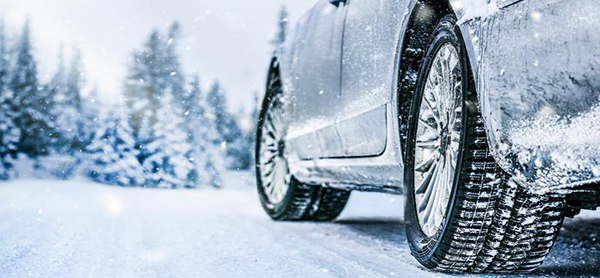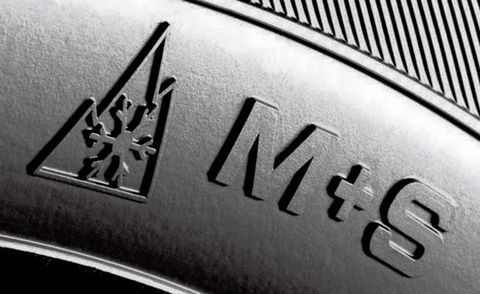Winter Tires vs. All Season Tires

In order to be safe while driving on snow and ice, winter tires are a necessity. Many people say that they have All-Season tires, so they should be fine. However, when they try winter tires, they are often surprised by how much better the winter tires are in terms of traction and handling.
Like the name implies, All-Season tires are designed to be adequate in every season, but this means that there are many compromises that need to be made. Many tire experts say that All-Season tires should really be called "3-Season" tires. The tread design for All-Season tires are not as aggressive as Winter tires, so an All-Season tier's tread will quickly get packed with snow and you will lose traction. In addition, many All-Season tires are promoted as being long lasting, and, in order to do this, the rubber needs to be harder.
Winter tires are designed to have biting edges to grip the snow and ice, but one of the main differences between an All-Season tire and a Winter tire is the rubber. Winter tires are softer which allows them to stick better to cold roads and stay flexible down to -40°C. All-Season tires are designed to protect your vehicle in temperatures above 7? while Winter tires are designed to protect your vehicle in temperatures below 7?. In Consumer Reports tests, Winter tires stopped 6 feet(1.8 m) shorter, on average, than All-Seasons on ice. Without Winter tires, you are more likely to lose control or crash during abrupt stops or sharp corners.
Of course, this does not mean that everyone needs Winter tires. However, if you drive in locations with moderate-severe snowfall, it would likely be a good idea to use Winter tires. If you need any advice on whether or not you need Winter tires, you can contact us, and we will try to help you get the tires you need to feel safe and in control of your vehicle.
All Weather, All Season and Winter Tires
Living in Canada means that you have to understand and deal with the elements as well as learn to safely navigate through them. So, it is important to get the right tires for the job. But between All-Season, All-Weather, and Winter tires, there are a lot of options to choose from. So, we hope to answer some of your questions about the differences between these tires and when they are appropriate to use.
| All-Season Tires | All-Weather Tires | Winter Tires | |
|---|---|---|---|
| Weather Conditions | Warm, dry, and wet conditions | Mild Winter conditions, including heavy rain and light snowfall. | Moderate/Harsh Winter conditions with lots of snow/ice |
| Temperatures | Above 7° | Above & Below 7° | Below 7° |
| Tread Pattern | Provides excellent grip in warmer conditions, not designed to deal with snow or slush. | Blocky tread pushes away slush and can deal with light snow, plus sensitive handling for warmer conditions. | Blocky tread and sipes grip snow and push away slush. |
| Rubber | Made from a harder compound to make it last longer in warmer conditions. | Flexible in temperatures above and below 7℃ | Stays soft in colder temperatures, allowing for better grip |
What's the Mountain Snowflake Symbol?

If heavy snow is common for your area, you might want to think twice about settling for all-season tires or regular winter tires. To be as safe and comfortable as possible on your commutes in the winter, it could be a good idea to look for the Mountain Snowflake.
The mountain snowflake symbol can be found on the sidewall of heavy duty tires that has been tested and produced specifically for the most brutal blizzards and cold conditions you could think of. A mountain snowflake means that it has been tested in extreme weather conditions and has met or exceeded the prerequisite capability requirements put out by the U.S Tire Manufacturers Association.
M + S vs. Mountain Snowflake Symbol
A tire that has an "M" and "S" signifies what is generally a manufacturer determined mud and snow rating. These tires generally have tire sipes designed to provide more grip in muddy and snowy conditions than tires that do not have the "M" and "S" rating.
Sometimes All-Season tires can even have this rating, but these should not be considered true snow tires or severe snow condition tires. Tires with the Mountain Snowflake symbol usually have the "M" and "S" rating because they have been rigorously tested in extreme weather conditions, but the M + S rating is not standardized like the Mountain Snowflake symbol. So, the M + S symbol can sometimes be unreliable.
Winter Tires FAQ
Do I really need Winter Tires?
Whether you need winter tires is generally dependent on the environment you drive in. If you live in an area where you deal with consistently cold weather or moderate snow conditions, winter tires are a wise investment. Winter tires have a cold weather tread compound that can deal with temperatures below 7? which drastically improves traction, handling, and the ability to brake in cold weather.
If I have Traction Control, do I need Winter Tires?
Traction control does not actually give your car "more" traction. Traction control limits your wheel spin to the amount of traction your tires can provide. The traction system only works effectively if your tires are able to deliver traction when needed, and, in the winter, the only way to maximize your traction is with a set of winter tires.
Do I need Winter Tires if my Car is Four-Wheel Drive?
While four-wheel drive vehicles are very valuable in adverse weather conditions and can even assist acceleration slightly during winter conditions, it is still not a replacement for winter tires. Without winter tires, braking and turning, can be just as dangerous for a four-wheel drive vehicle as it is for a two-wheel drive vehicle. Four-wheel drive can help, but it is the most effective when combined with winter tires.
When should I Install my Winter Tires?
When the temperature drops consistently below 7? and before the first snowfall, it is usually a good time to change over to winter tires. This will give you optimal control, and it helps you beat the rush of people that change over during the first storm of the year.
Winter tires tend to wear faster in warmer temperatures, so when the temperature is consistently warmer than 7?, it is a good idea to switch over to your summer or all-season tires.
Are Winter Tires Noisy?
Winter tires get a bad rap for being noisy -- which had a degree of truth in the past. However, this is no longer the case. You may hear a slight difference between your winter tires and your summer/all-season tires, but, in the end, the increase in safety is well worth a miniscule increase in noise.
Are Winter Tires Expensive?
While buying winter tires may feel like you are making an extra purchase, it can actually save you money in the long run. Using winter tires allows you to preserve the life of your summer/all-season tires. Summer/all-season tires are not built for extremely cold temperatures, and are much more prone to cracking in the winter as a result. With proper use and maintenance, winter tires can last multiple winters, and this means an extended life for your summer/all-season tires.
